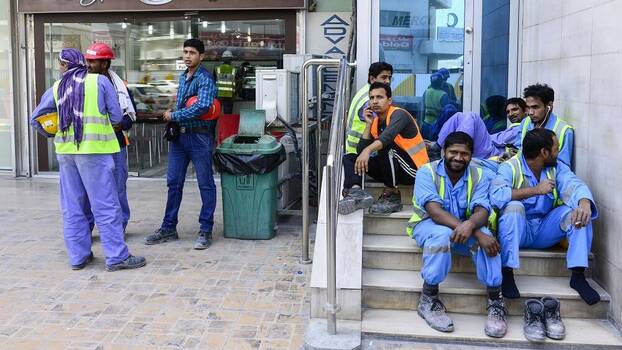
Thousands of Indian migrant workers who built magnificent stadiums, luxurious hotels, highways, and parks in Qatar for the 2022 FIFA World Cup have lost hope of getting their unpaid wages as the international football tournament draws to a close.
Rejimon Kuttappan is an independent journalist and the author of Undocumented (Penguin, 2022).
The unpaid workers fear that after France and Argentina play the final match in Lusail Stadium on Sunday, 18 December, and the winning team flies back with the solid gold trophy worth 250,000 dollars and 45 million dollars in prize money, the world will forget about their plight. This is particularly bitter given the coincidence that 18 December is also International Migrants Day and Qatar National Day.
“In 2015, when our company [Bin Omran Trading Contracting] got the contract to build Al Bayat stadium, we could see only a barren land there. Our job was to fill the barren land with mud, leaving a hole in the middle. That hole is now the green pitch, and the area we filled with mud is where now the 60,000 seats are fitted”, Paulson Johnson, an Indian excavator operator who is still owed 9,000 US dollars from the company, said.
Al Bayat Stadium hosted nine matches.
“At the end of 2019, we went to see the completed stadium. We were stunned and felt proud then. But this May, when we were forced to leave empty-handed, we left Doha hanging our heads”, he said.
According to Paulson, since 2016, the company paid workers monthly salaries irregularly. Documents of Paulson and 17 co-workers that he showed me reveal that they are still owed 126,000 dollars.
“We even approached global organizations to get back our unpaid wages. They told us we should be hopeful. But as the game has ended, we are now hopeless”, he added.
Systematic Wage Theft at the World Cup
Paulson and his friends’ case is not an isolated one. John Mathew, an Indian man who worked as a quality control inspector at Al Jaber Group, said he was yet to receive eight months’ salary and 16 years’ end-of-service benefits, and he left the country after giving power of attorney to a friend to represent him.
“My unpaid salary was around 16,000 US dollars. Additionally, there are 16 years of end-of-service benefits, too”, he added.
Sojan Augustine, a draughtsman from the same Al Jaber Group, said he has to “get around 12,000 dollars from the company”.
Augustine alleged that he had approached the Indian Embassy seeking a solution, but officials did not show any interest in resolving his grievances.
The Al Jaber group laid off Mathew and Augustine, along with hundreds of others, between March and August this year. Only a few had received their unpaid wages, or at least part of them.
On 14 August, a few workers from Al Bandary and its subsidiary Electrowatt staged a protest in Doha — rare in an Arab country — demanding their unpaid wages. Some 60 workers attended. They were detained, sent to prison, and deported.
Anwar M., 32, an Indian migrant worker at Al Bandary who was arrested and deported to India on 2 September after spending 20 days in jail, said that he was fooled:
We were kept in jail for 14 days. I resigned in June 2022. I had to get nine years’ end-of-service benefits and seven months’ salary. My money was given in jail, but there was a miscalculation. The overtime pay wasn’t calculated properly. But there was no option to question that. We had to leave with whatever we got.
Meanwhile, Moncy K., an Indian architect who had worked in Doha when the Qatar was awarded the 2022 World Cup, said that he didn’t get his wages despite approaching the highest court in the Arab country.
In 2014, Manoj’s company built the offices for Qatar’s Supreme Committee for Delivery and Legacy (SC), the authority tasked with organizing the World Cup, on the 38th and 39th floors of Doha’s landmark al-Bidda skyscraper – known as the “Tower of Football”.
But the government shut down the company, citing security issues. Migrant workers were sent back to their home countries. Moncy recalls:
I stayed back because I got a job. I started fighting the case. In between, I moved to the United Kingdom. I was following up my case ... Finally, the verdict came in my favour, but I didn’t get money. The government officials said, my file is missing.
No Remedy for Migrant Workers
The Guardian first reported on the termination of World Cup workers back in 2014. In the same year, global trade unions and human rights organizations complained to the International Labour Organization that Qatar was not complying with international labour standards.
They alleged that the kafala or sponsorship system, which ties employees to a certain employer, enables exploitation and forced labour, and that the authorities were not adequately detecting violations of labour rights. The complaint led to several labour reforms, including the creation of labour tribunals and the implementation of a minimum wage for all migrant workers. But on 19 November, Human Rights Watch reported that the World Cup had opened “without remedy for migrants”.
“As the World Cup opens, migrant workers and their families, players, and fans will be feeling the terrible weight of the human cost of the tournament”, said Michael Page, deputy Middle East and North Africa director at Human Rights Watch.
It looks like Qatar hasn’t heeded the global rights bodies’ call. With the end of the World Cup, not only are Paulson, Mathew, and Augustine left without hope, but their families, too.